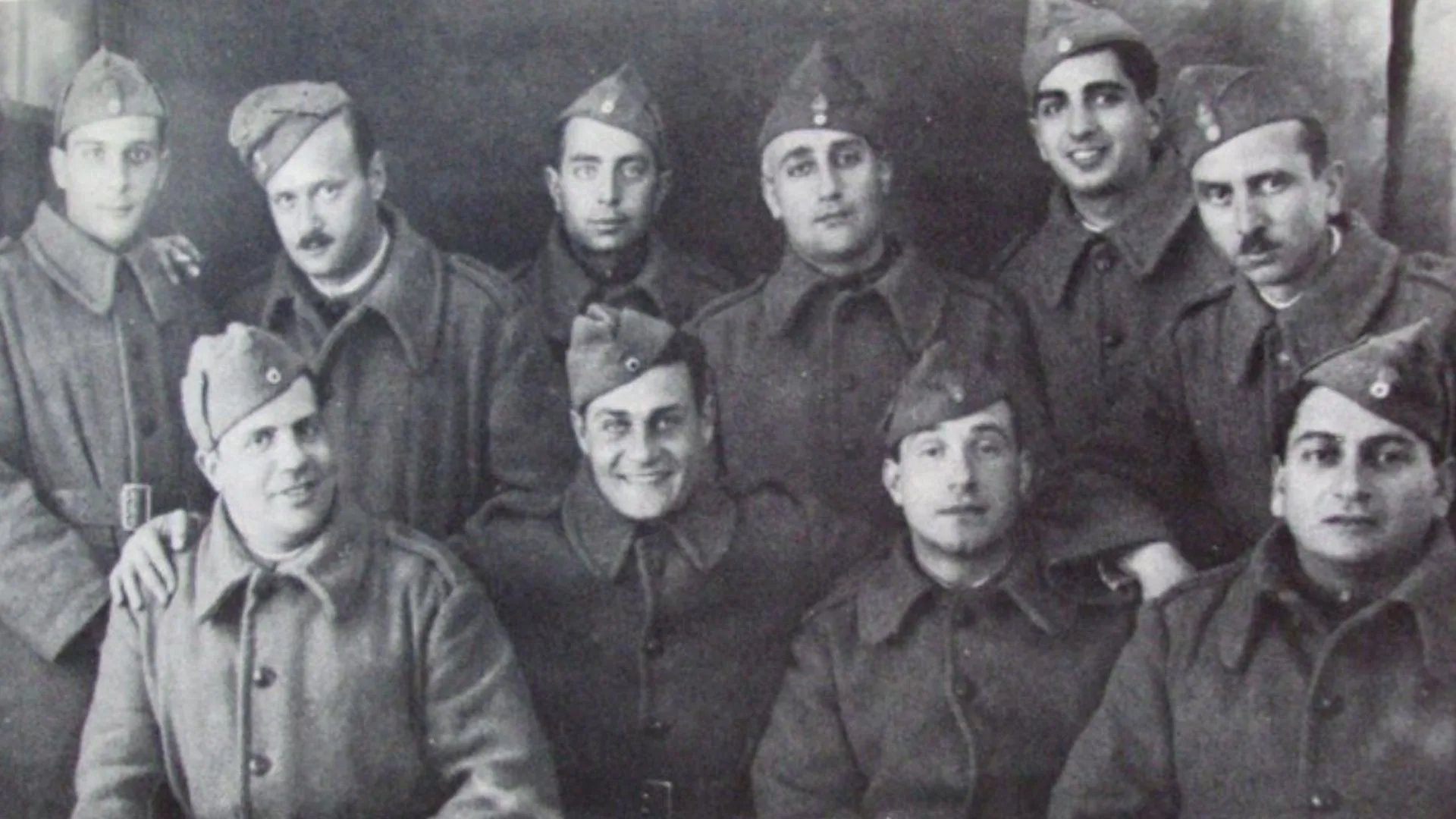Actors, painters, poets, and novelists appeared on the front lines, proving they were not “weaklings,” as was the term of the time, and most importantly, they did not try to evade service.
Lambros Konstantaras
At 27 years old, Lambros Konstantaras volunteered for the Albanian front as a reserve officer. He fought on the front line alongside his close friend, Odysseas Elytis. In one battle, Konstantaras was injured, and Elytis helped him. He carried him, severely wounded, to the hospital. As a result of the injury, Konstantaras was left with a lifelong issue with his hip and head.
“He had small fragments from the war that hadn’t been removed, and they caused problems later in life,” Maro Kontou said.
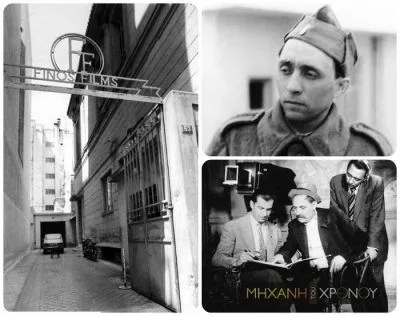
“I had been wounded in the head at the Albanian front, and they asked for my signature to perform a skull surgery. I didn’t sign, and that saved me. Who knows where I would be now if I’d acted differently,” Konstantaras said in an interview.
After recovering, he requested to return to the front line and was decorated for his service.
Dionysis Papagiannopoulos
The actor Dionysis Papagiannopoulos was called to serve on the front line when war broke out in 1940 and took part in significant battles. Living conditions in the mountains were harsh for him and the other soldiers.
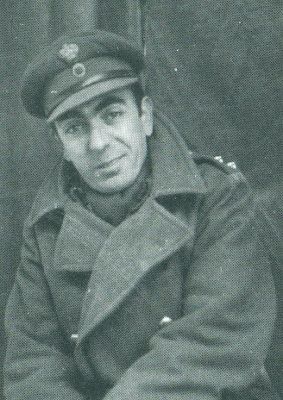
Much later, when the war was a distant memory, he said in an interview, “No matter how many years pass, you never forget. How could I erase from my memory the assault on the height of Agios Athanasios in Chimara? We climbed with our hands and feet, fighting with rocks.”
He added, “I had five rounds of ammunition for 20 hours. Where we had climbed, the supplies couldn’t reach us. We fought with stones.”
Papagiannopoulos survived the front line and, after the capitulation, returned to his hometown, Diakofto, on foot.
During the German occupation, Papagiannopoulos continued performing in theatres. One evening, a German commander knocked on his door to congratulate him, but Papagiannopoulos refused to see him. The commander was Max Merten, the political head of Thessaloniki, responsible for the massacre of Greek Jews.
Mimis Fotopoulos
During the occupation, Mimis Fotopoulos joined the resistance and became involved with the National Liberation Front (EAM). Due to his education, he took on a more “enlightening” role, spreading revolutionary ideas to the people.
In 1944, he joined the United Artists troupe, a group of actors who, through their performances, promoted left-wing ideas. As a member of this troupe, Fotopoulos participated in shows held in underground theatres, under the watchful eye of ELAS personnel, who protected actors and audiences from potential attacks.
Later, he was punished for his leftist ideas. On New Year’s Eve 1945, he was arrested and exiled to El Daba in Africa, returning to Greece in March that year.
Kostas Hatzichristos
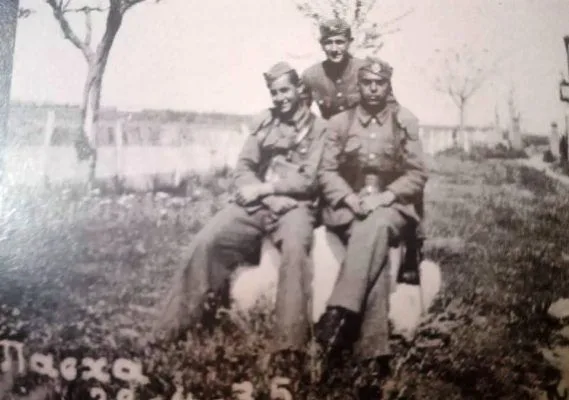
Hatzichristos had a deep love for the military from a young age. He wanted to become an officer and, after finishing school, joined the Military Academy in Syros.
A few days after his graduation, World War II broke out, and he fought on the Albanian front. After the first fifteen days, he suffered from frostbite and could no longer walk, so he was sent to the rear. He recounted, “When the captain saw me, he said sarcastically, ‘What are you doing here? With those legs, you could be skating. You call this frostbite? I’ll send you back.'”
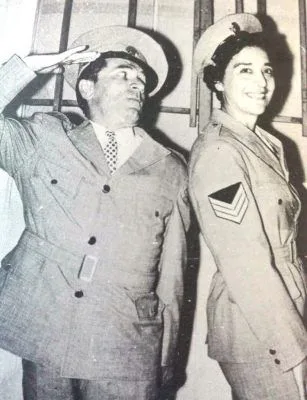
However, the captain was sent to the front, and Hatzichristos became the commander of the annex of the 1st Hospital in Koritsa. Across from the hospital was a café owned by an Albanian, where his beautiful sister, Ohrana, worked. Hatzichristos liked her and fulfilled all her requests, giving her blankets and supplies, only to later discover that she was working with the Italians.
Manos Katrakis
During the Greco-Italian War, actor Manos Katrakis found himself on the front line. He was the only one to witness his commander’s suicide, as the latter couldn’t bear the disarmament by the enemy.
When Katrakis returned to Athens in 1941, life was extremely difficult due to hunger. Despite the daily struggle for survival, he married during the occupation.
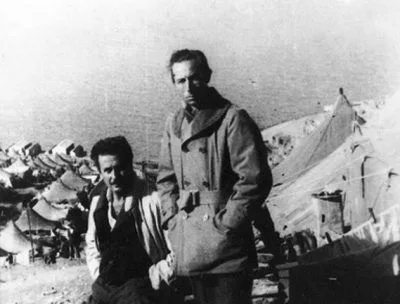
Things worsened, and like thousands of citizens, Katrakis was forced to sell even his clothes to secure food. He joined EAM and the Communist Party, fighting in the National Resistance.
When asked to sign a declaration renouncing his communist beliefs, Katrakis refused. He was persecuted, tortured, and exiled to Makronisos and Ai Stratis for nearly seven years, returning to Athens in the early 1950s.
Odysseas Elytis
With the outbreak of the war in 1940, Elytis enlisted as a second lieutenant at the Headquarters of the First Army Corps. On December 13, 1940, he was transferred to the combat zone.
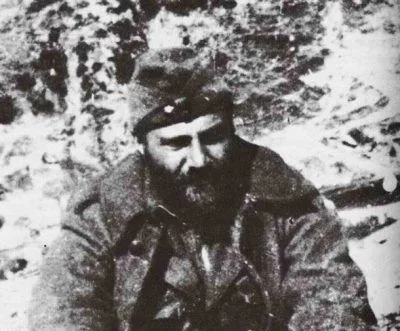
On February 26, 1941, he was hospitalised with severe typhoid in Ioannina. Elytis believed he had fallen ill due to the dirty water they drank, which “they found between the corpses of mules.” After recovering, he returned to Athens. In 1945, he presented his poetic work “Heroic and Elegiac Song,” which referred to a lost second lieutenant of Albania. Some believe it was written about his fellow soldiers on the Albanian front, while others think it was for his friend, poet Giorgos Sarandaris, who also fought in Albania and died after being transported gravely ill to Athens.
Angelos Terzakis
Writer and essayist Angelos Terzakis also fought in the Greco-Italian War. His son, Dimitris, recalled in a documentary, “The first image I had of my father was terrifying. I was two and a half years old then. A wild-looking man entered, with a long beard and a tattered soldier’s uniform. He wanted to hug me but didn’t because he was covered in lice.”
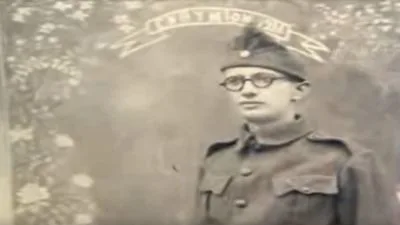
In one story, Terzakis was spared from certain death. A captain told him at the last moment to get off the truck before his unit went on a mission, knowing they were heading into a deadly trap. None returned. Terzakis recorded his war experiences in several stories, including his book “April.”
These individuals from the world of arts and letters were not only influential in their crafts but also made significant contributions on the battlefield, shaping the history of Greece both in wartime and in peace.
